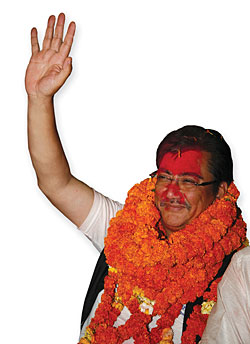 MIN RATNA BAJRACHARYA |
With all that red abir and khaada, were those the election victory celebrations of a business body or the student wing of a political party? That was the question going through my mind upon watching the TV footage of Suraj Vaidya's victory in this week's Federation of Nepalese Chambers of Commerce and Industry (FNCCI) elections.
The FNCCI bills itself as "an umbrella organisation of Nepal's private sector." But its working definition of that private sector is visibly narrow: a few family-run behemoths that have done well since the time the government handed monopoly licenses some 50-odd years ago, many large trading firms that import goods and sell locally at high margins, a growing number of businesses outside of Kathmandu that have been started by many locally influential jamindars, and various lobbying groups that push for pro-industry and pro-firm concessions.
Characterising the FNCCI as such is not to criticise it. It is to explain what it is.
As such, one should not expect FNCCI to advance the agenda of entrepreneurship, innovations, and bold thinking, such as by finding ways to better treat Nepal's migrant workers. Nor should one expect it to promote small and medium businesses that provide self-employment to many. Nor does one expect it to push for pro-market and pro-competition economic policies that call for a level playing field.
And so, given its nature and the expectations of members who will presumably want to extract their pound of flesh after having spent more than 50 million rupees on the elections, can there be a vision for the new FNCCI leadership? Yes, if Vaidya spends his three-year term focusing on these two critical problems facing the private sector.
Image: The Nepali private sector needs a drastic image makeover. It needs to sell itself to the public as a provider of jobs, as a pillar of the community, and as the payers of taxes which in turn pay for public goods. At present, private sector companies are widely and unfairly perceived to be dominated by a few crooks that are seen as tax cheats. This gives the whole sector a bad image at a time when businesses need public support.
Vaidya and his team need not be defensive about the entire range of unsavoury business practices in vogue. But they should use their position to positively sell, through speeches, activities and white papers, the upside of broader private sector-led growth for jobs and prosperity in Nepal.
Security: Few businessmen think of starting a factory in Nepal for fear of having to deal with militant and politically charged trade unions. So long as Maoist unions remain as active as they are, nobody in his right mind will invest in the type of company that can generate hundreds of jobs.
In the five years since Jana Andolan II, businesses have not enjoyed the fruits of a peace dividend in the form of security. The numbers of labour strikes, physical attacks, acts of intimidation, and extortion have all gone up. Indeed, the only thing one remembers from the outgoing FNCCI president Kush Joshi's time is his call to unite against the six-day Maoist banda last May. The challenge facing Vaidya's team to enable a secure environment for honest business is big.
But if Vaidya is planning to stick to the FNCCI tradition of getting into bed with politicians, then the celebratory scenes of Wednesday only confirm that like with politics, it's going to be business as usual.



